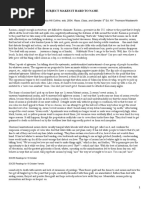IRS Info
IRS Info
Uploaded by
katenunleyCopyright:
Available Formats
IRS Info
IRS Info
Uploaded by
katenunleyCopyright
Available Formats
Share this document
Did you find this document useful?
Is this content inappropriate?
Copyright:
Available Formats
IRS Info
IRS Info
Uploaded by
katenunleyCopyright:
Available Formats
What is the difference between non-profit and tax-exempt status?
Non-profit status is a state law concept. Non-profit status may make an organization eligible
for certain benefits, such as state sales, property, and income tax exemptions. Although most
federal tax-exempt organizations are non-profit organizations, organizing as a non-profit
organization at the state level does not automatically grant the organization exemption from
federal income tax. To qualify as exempt from federal income taxes, an organization must
meet requirements set forth in the Internal Revenue Code. See Types of Tax-Exempt
Organizations or Publication 557 for more information.
To be tax-exempt under section 501(c)(3) of the Internal Revenue Code, an organization must
be organized and operated exclusively for exempt purposes set forth in section 501(c)(3), and
none of its earnings may inure to any private shareholder or individual. In addition, it may not
be an action organization, i.e., it may not attempt to influence legislation as a substantial part
of its activities and it may not participate in any campaign activity for or against political
candidates.
Organizations described in section 501(c)(3) are commonly referred to as charitable
organizations. Organizations described in section 501(c)(3), other than testing for public
safety organizations, are eligible to receive tax-deductible contributions in accordance with
Code section 170.
The organization must not be organized or operated for the benefit of private interests, and no
part of a section 501(c)(3) organization's net earnings may inure to the benefit of any private
shareholder or individual. If the organization engages in an excess benefit transaction with a
person having substantial influence over the organization, an excise tax may be imposed on
the person and any organization managers agreeing to the transaction.
Section 501(c)(3) organizations are restricted in how much political and legislative (lobbying)
activities they may conduct. For a detailed discussion, see Political and Lobbying Activities.
For more information about lobbying activities by charities, see the article Lobbying Issues;
for more information about political activities of charities, see the FY-2002 CPE topic
Election Year Issues.
Exempt Purposes - Internal Revenue Code Section 501(c)(3)
The exempt purposes set forth in section 501(c)(3) are charitable, religious, educational,
scientific, literary, testing for public safety, fostering national or international amateur sports
competition, and preventing cruelty to children or animals. The term charitable is used in its
generally accepted legal sense and includes relief of the poor, the distressed, or the
underprivileged; advancement of religion; advancement of education or science; erecting or
maintaining public buildings, monuments, or works; lessening the burdens of government;
lessening neighborhood tensions; eliminating prejudice and discrimination; defending human
and civil rights secured by law; and combating community deterioration and juvenile
delinquency.
You might also like
- Explains The Purpose Scope and Key Requirements of The Gramm Leach Bliley Act GlbaNo ratings yetExplains The Purpose Scope and Key Requirements of The Gramm Leach Bliley Act Glba1 page
- Associational Structures of Religious Organizations100% (1)Associational Structures of Religious Organizations43 pages
- Zombie Lending and Financial Restructuring in JapanNo ratings yetZombie Lending and Financial Restructuring in Japan36 pages
- Run Your Own Vehicle On Water Kit Rip-Off?No ratings yetRun Your Own Vehicle On Water Kit Rip-Off?2 pages
- 30 Points of IRS Control Over 501-C-3 ChurchesNo ratings yet30 Points of IRS Control Over 501-C-3 Churches3 pages
- What Is IRS Publication 557?: Internal Revenue Service Tax-Exempt Status100% (1)What Is IRS Publication 557?: Internal Revenue Service Tax-Exempt Status2 pages
- Saving The Drea M: A Consumer'S Guide To Loan ModificationsNo ratings yetSaving The Drea M: A Consumer'S Guide To Loan Modifications83 pages
- H.R. 3448: Student Debt Cancellation Act of 2019No ratings yetH.R. 3448: Student Debt Cancellation Act of 20198 pages
- Service GDC GDCLCCN 19 00 80 23 19008023 19008023100% (1)Service GDC GDCLCCN 19 00 80 23 19008023 1900802328 pages
- Discrimination Lawsuit Against City of MidfieldNo ratings yetDiscrimination Lawsuit Against City of Midfield12 pages
- Oaktree Stipulation of Settlement Signed by Court 0No ratings yetOaktree Stipulation of Settlement Signed by Court 034 pages
- Ombudsman's Special Investigation Into Management of Prisoner Arthur Taylor in Auckland Prison, New ZealandNo ratings yetOmbudsman's Special Investigation Into Management of Prisoner Arthur Taylor in Auckland Prison, New Zealand34 pages
- The Tax Law of Private Foundations 2022 Cumulative Supplement (Bruce R. Hopkins, Shane T. Hamilton) (Z-Library)No ratings yetThe Tax Law of Private Foundations 2022 Cumulative Supplement (Bruce R. Hopkins, Shane T. Hamilton) (Z-Library)305 pages
- Vaccination Notice: Notice To Agent Is Notice To Principal Notice To Principal Is Notice To AgentNo ratings yetVaccination Notice: Notice To Agent Is Notice To Principal Notice To Principal Is Notice To Agent3 pages
- Into Thy Word Bible Study in Revelation:: General Idea: The Second Beast Appears As He Comes Out of The Earth. He, TooNo ratings yetInto Thy Word Bible Study in Revelation:: General Idea: The Second Beast Appears As He Comes Out of The Earth. He, Too8 pages
- Before The South Mumbai District Consumer Disputes Redressal ForumNo ratings yetBefore The South Mumbai District Consumer Disputes Redressal Forum8 pages
- Macroeconomic Analysis and Policy: Assignment On: Bank-Customer Relationship (Bank As Creditor)No ratings yetMacroeconomic Analysis and Policy: Assignment On: Bank-Customer Relationship (Bank As Creditor)4 pages
- US Internal Revenue Service: I1040sse - 1998No ratings yetUS Internal Revenue Service: I1040sse - 19984 pages
- Smith - I - 2003 - The Law and Economics of Marriage Contracts - Journal of Economic Surveys - Supplemental ReadingNo ratings yetSmith - I - 2003 - The Law and Economics of Marriage Contracts - Journal of Economic Surveys - Supplemental Reading26 pages
- How To Remove A Charge Off From Your Credit ReportNo ratings yetHow To Remove A Charge Off From Your Credit Report3 pages
- Application For Benefits: Who May ApplyNo ratings yetApplication For Benefits: Who May Apply24 pages
- Health Reform without Side Effects: Making Markets Work for Individual Health InsuranceFrom EverandHealth Reform without Side Effects: Making Markets Work for Individual Health InsuranceNo ratings yet
- Crowdfunding in 2014 (Understanding a New Asset Class)From EverandCrowdfunding in 2014 (Understanding a New Asset Class)No ratings yet
- Swindled: If Government is ‘for the people’, Why is the King Wearing No Clothes?From EverandSwindled: If Government is ‘for the people’, Why is the King Wearing No Clothes?5/5 (2)
- Perfecting Religious Exemption from Vaccination: Step up to Secure Freedom of ReligionFrom EverandPerfecting Religious Exemption from Vaccination: Step up to Secure Freedom of ReligionNo ratings yet
- The Tribulation Guide: New Revelation of the End Times and the Book of RevelationFrom EverandThe Tribulation Guide: New Revelation of the End Times and the Book of RevelationNo ratings yet
- Comments on the SEC's Proposed Rules for Regulation CrowdfundingFrom EverandComments on the SEC's Proposed Rules for Regulation CrowdfundingNo ratings yet
- G.R. No. 145226 February 06, 2004 LUCIO MORIGO y CACHO, Petitioner, People of The Philippines, RespondentNo ratings yetG.R. No. 145226 February 06, 2004 LUCIO MORIGO y CACHO, Petitioner, People of The Philippines, Respondent3 pages
- The Plight of Refugees in Malaysia: Malaysia As A Transit Country in Protecting Refugees' RightsNo ratings yetThe Plight of Refugees in Malaysia: Malaysia As A Transit Country in Protecting Refugees' Rights18 pages
- Interview With Lieutenant General Yawd Serk, Shan South Army, RCSSNo ratings yetInterview With Lieutenant General Yawd Serk, Shan South Army, RCSS4 pages
- Role Profile: Country Director - Concern WorldwideNo ratings yetRole Profile: Country Director - Concern Worldwide5 pages
- Remo v. Honorable Secretary of Foreign Affairs, G.R. No. 169202, March 5, 2010No ratings yetRemo v. Honorable Secretary of Foreign Affairs, G.R. No. 169202, March 5, 20103 pages
- Something About The Subject Makes It Hard To NameNo ratings yetSomething About The Subject Makes It Hard To Name3 pages
- State of Maharashtra V Madhuri Maruti Vidhate 30 Sep 2022 437885No ratings yetState of Maharashtra V Madhuri Maruti Vidhate 30 Sep 2022 4378854 pages
- Why Public Administration Take Emphasis On Efficiency and Effectiveness of Public Organization? I. Problem StatementNo ratings yetWhy Public Administration Take Emphasis On Efficiency and Effectiveness of Public Organization? I. Problem Statement2 pages
- Schoucair v. Michigan Department of Corrections Et Al - Document No. 4No ratings yetSchoucair v. Michigan Department of Corrections Et Al - Document No. 43 pages
- Renewal Jonathan Rutherford Drew Westen The Political BrainNo ratings yetRenewal Jonathan Rutherford Drew Westen The Political Brain6 pages
- BUKLOD NG KAWANING EIIB V ZAMORA - 2001 - Digest0% (1)BUKLOD NG KAWANING EIIB V ZAMORA - 2001 - Digest1 page





























































































